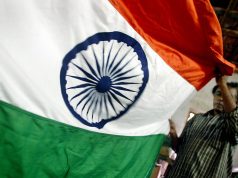Boycott of Chinese products unwise, to hurt local companies, economists say

By Beatriz Marie D. Cruz, Reporter
A PLEA by the Philippine Senate president to boycott Chinese products in protest of its alleged bullying in the South China Sea is ill-advised and would be bad for local companies, economists said at the weekend.
The proposal is a knee-jerk reaction, John Paolo R. Rivera, president and chief economist at Oikonomia Advisory & Research, Inc., said in a Viber message.
“The Philippines needs to exercise caution in using economic approaches to a geopolitical issue given how fragile our economy is,” Mr. Rivera said in a Viber chat.
“With slowing economic growth, retaliation on economic grounds might backfire given how large our trade is with China in terms of both imports and exports,” he added.
Senate President Juan Miguel F. Zubiri last week urged Filipinos to boycott Chinese products and companies to protest China’s harassment of Philippine vessels in the South China Sea.
“Let’s just boycott Chinese-made products, let’s boycott Chinese companies coming in here to show them our anger,” Mr. Zubiri told 360 radio.
Last week, the Philippines accused China’s coast guard of blocking and shooting a water cannon at its vessels on a resupply mission to a Philippine military outpost at Second Thomas Shoal.
The Chinese coast guard’s “dangerous maneuvers” prevented a second boat from unloading the supplies and completing the mission, the Philippine military said.
Mr. Zubiri said the Philippines should look for other trading partners and lessen dependence on China.
“We should not forget that China is the factory of the world,” Mr. Rivera said. “Practically a large bulk of contemporary global consumer products is made in China,” Hansley A. Juliano, a political economy researcher studying at Nagoya University’s Graduate School of International Development in Japan, said in a Facebook Messenger chat.
He said commodities like lifestyle brands and electronic devices are assembled and made in Chinese factories, and a boycott would be pointless.
“Even if we boycott openly Chinese brands, products and services, the bulk of Chinese economic profit don’t even come from them anymore,” he said. “Any legacy American and European brands also involve Chinese capital and stockholders.”
China remains the top source of Philippine imports, accounting for 22.4% or $2.38 billion of the total.
In February, the Philippine Senate ratified the Regional Comprehensive Economic Partnership (RCEP), the world’s largest free trade agreement, which covers nearly a third of the global population and about 30% of its global gross domestic product.
The trade deal that took effect in 2022 is heavily supported by China, whose trade with member countries accounted for 30.4% of its total foreign trade value, according to a May 2022 analysis by China Briefing.
“Our largest exports also look like the stuff that will ultimately be assembled in a Chinese factory to be sold back to us,” Mr. Juliano said.
China accounted for $1.39 billion worth of Philippine-exported nickel ore, $1.25 billion worth of refined copper, and $5.15 billion worth of integrated circuits, 2021 according to data from the Observatory of Economic Complexity.
“What’s the use of a boycott that will hit smaller enterprises and engender resentment of Filipinos who may have had trade and industry ties to China?” Mr. Juliano said.
There are more effective ways to assert the country’s rights in the South China Sea without compromising the economy, according to Mr. Rivera.
“The Philippines should instead strengthen its industries, invest in production complexities so we reduce dependence on imports and enhance exports, allowing us to have more trading partners beyond the usual,” he said.
The Permanent Court of Arbitration in the Hague in 2016 voided China’s expansive claims in the South China Sea. China has ignored the ruling.
The Philippines has filed 35 diplomatic protests against China this year over what it called harassment by China’s coast guard and its vast fishing fleet, according to the Foreign Affairs department.



